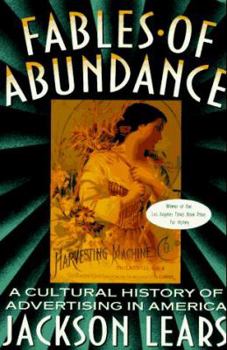Fables of Abundance: A Cultural History of Advertising in America
Select Format
Select Condition 
Book Overview
Fables of Abundance ranges from the traveling peddlers of early modern Europe to the twentieth-century American corporation, exploring the ways that advertising collaborated with other cultural institutions to produce the dominant aspirations and anxieties in the modern United States.
Format:Paperback
Language:English
ISBN:0465090753
ISBN13:9780465090754
Release Date:November 1995
Publisher:Basic Books
Length:512 Pages
Weight:1.58 lbs.
Dimensions:1.4" x 6.1" x 9.2"
Customer Reviews
2 ratings
Excellent, and counterintuitive
Published by Thriftbooks.com User , 24 years ago
Most people find advertising very irritating. This is not only understandable, but necessary and just. But what is it about advertising that should put one's teeth on edge? It is easy to believe that advertising encourages a world of greed and gaudy consumerism, a life of sterile self-indulgence. This was the view of the great American critic Thorstein Veblen. But one should avoid this temptation. In this book Jackson Lears provides a book that is not only revelatory about advertising but will help the reader about culture, nostalgia, memory, even life itself. Lears, a historian who is not afraid to quote Marxists, agrees with Adorno that Veblen's attack on consumerism was an "attack against culture." Veblen represented a puritanical producerism that did not recognize the aesthetic and imaginative elements of consumption. Lears throughout this subtle and evocative book argues that advertising did not present the triumph of hedonism, but in fact the regulation of consumption to a strict regime of productivity, a trade-off between "routinized labor and zestful consumption." The book does not follow a simple narrative. But it does provide a fascinating account with many pregant apercus about the cold presence of an inhumane positivism, as well as the flaws of both the jargon of authenticity and the New York Intellectuals conflation of politics and style. Starting with the image of the breast and the cornocopia, and going on to the illusions of the Plain speech tradition, Lears looks not only at advertisements, but also cites much literature and theory to help him along. Melville, Dreiser, James and Proust are all invoked, Little Nemo and Krazy Kat are properly praised, coming to a benediction looking at the special achievement of Joseph Cornell and his boxes. Some readers of this review may find this summary pretentious, but those who go on to read Lears will find much that is truly revelatory.
wordy but gratifying
Published by Thriftbooks.com User , 25 years ago
Fables of Abundance is not an easy book to read. Lears sometimes takes relatively simple ideas and complicates them with wordy rhetoric. If you can get through it, however, Fables of Abundance offers a novel approach to looking at the history of advertising. It does not discuss particular ad campaigns or products like many books of its type. It instead focusses on advertising's reoccuring themes (i.e. the carnivalesque) and images (i.e. woman as symbol of abundance). The author also provides biographies of important figures in the history of advertising. Overall, if you have patience and a dictionary, Fables of Abundance is for you.






